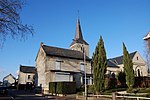1948 UCI Road World Championships
1948 UCI Road World Championships1948 in Dutch sport1948 in road cyclingCycling stubsInternational cycle races hosted by the Netherlands ... and 1 more
UCI Road World Championships by year

The 1948 UCI Road World Championships was the 21st edition of the UCI Road World Championships It took place on Saturday 21 and Sunday 22 August 1948 in Valkenburg, the Netherlands. For the first time, six riders per country were allowed to participate in the professional race. The Cauberg had to be climbed every lap. Briek Schotte became the winner in the professional cyclists' road race after 266.8 kilometres of cycling (27 laps). Only 10 of the 50 riders who started rode out the race. In the same period, the 1948 UCI Track Cycling World Championships were organized in the Olympic Stadium of Amsterdam, the Netherlands.
Excerpt from the Wikipedia article 1948 UCI Road World Championships (License: CC BY-SA 3.0, Authors, Images).1948 UCI Road World Championships
Bergstraat, Valkenburg aan de Geul
Geographical coordinates (GPS) Address Nearby Places Show on map
Geographical coordinates (GPS)
| Latitude | Longitude |
|---|---|
| N 50.849722222222 ° | E 5.8330555555556 ° |
Address
Groeve Lemmekenskoel
Bergstraat
6301 AH Valkenburg aan de Geul
Limburg, Netherlands
Open on Google Maps








